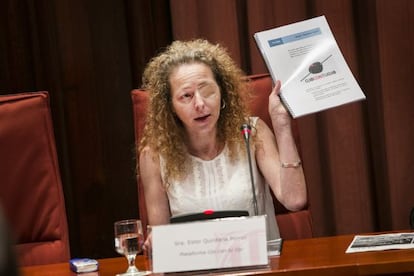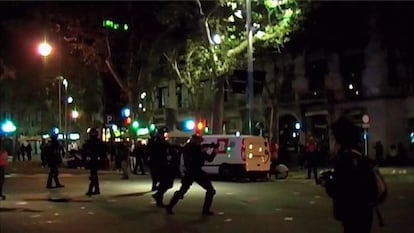Catalan government pays €261,000 to woman who lost eye to rubber bullet
Officials and police repeatedly denied that projectiles could have injured Ester Quintana Her lawyer hopes the decision will help other victims in similar circumstances


The Catalan department for internal affairs is paying out nearly €261,000 in damages to a woman who lost an eye at a general strike on November 14, 2012.
A court has received the payment for Ester Quintana, whom a pre-trial investigation found to have been wounded by a rubber bullet fired by Catalan riot police.
Two officers from the Mossos d’Esquadra regional police force, Eduardo C. and Llorenç B., will stand trial for their actions.
No amount of money can make up for what the Mossos did to us”
Ester Quintana
However, regional officials underscored that the financial compensation only represents “civil responsibility” in the event that the officers are found guilty, and that the Catalan government is in no way assuming any responsibility of its own in the case.
Interior chief Jordi Jané had already stated over the course of the summer that the early payment of €260,931 was “not an admission of guilt, but a show of goodwill.”
The specific amount was agreed to following weeks of negotiations between the Catalan government’s insurer, SegurCaixa, and Quintana’s legal representatives.
At a press conference held at the Federation of Barcelona Neighborhood Associations, her lawyer Laia Serra said the move was “a very important step forward” and trusted that “it will have an effect on other victims of rubber bullets; there are still many cases left to solve.”
The money is meant to cover Quintana’s medical and legal expenses, including expert reports.
“We celebrate the fact that they paid before the trial,” added Serra.
Quintana also expressed satisfaction at the news, but added that “no amount of money can make up for what the Mossos did to us,” a reference to other people who have also lost eyes to rubber bullets fired by riot police in the past.

The Quintana case triggered a government ban on the use of rubber bullets. Instead, riot police now use rifles that fire visco-elastic foam pellets.
But Catalan officials and the regional police repeatedly denied that any rubber bullets had been fired at the general strike, suggesting that Quintana was hurt by rioters – until a court investigation based on video footage and witness reports debunked that claim.
Her lawyer on Tuesday alluded to the Catalan government’s attitude in the case and its own contradictory versions, expressed at various times.
“The Generalitat’s strategy has been disastrous, absurd, anti-democratic,” she said.
On November 14, 2012, with Spain in the grip of the economic crisis, hundreds of thousands marched on the streets to protest Prime Minister Mariano Rajoy’s labor reform package and austerity measures.
English version by Susana Urra.
Tu suscripción se está usando en otro dispositivo
¿Quieres añadir otro usuario a tu suscripción?
Si continúas leyendo en este dispositivo, no se podrá leer en el otro.
FlechaTu suscripción se está usando en otro dispositivo y solo puedes acceder a EL PAÍS desde un dispositivo a la vez.
Si quieres compartir tu cuenta, cambia tu suscripción a la modalidad Premium, así podrás añadir otro usuario. Cada uno accederá con su propia cuenta de email, lo que os permitirá personalizar vuestra experiencia en EL PAÍS.
¿Tienes una suscripción de empresa? Accede aquí para contratar más cuentas.
En el caso de no saber quién está usando tu cuenta, te recomendamos cambiar tu contraseña aquí.
Si decides continuar compartiendo tu cuenta, este mensaje se mostrará en tu dispositivo y en el de la otra persona que está usando tu cuenta de forma indefinida, afectando a tu experiencia de lectura. Puedes consultar aquí los términos y condiciones de la suscripción digital.








































